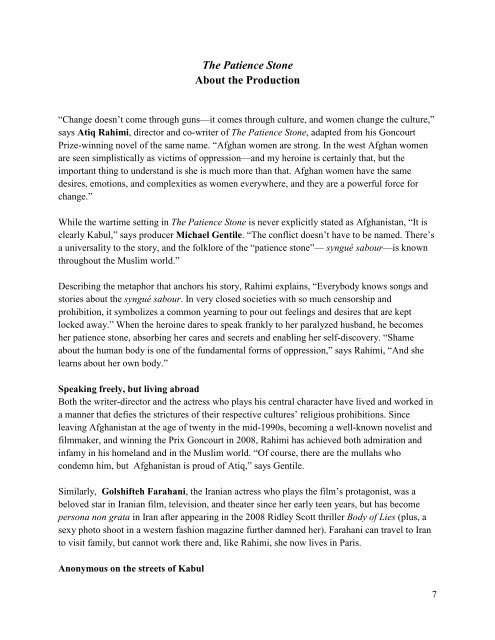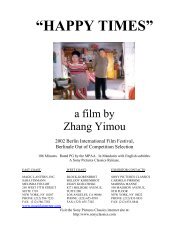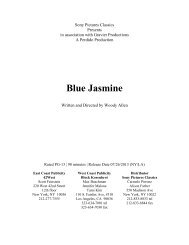Press Kit - Sony Pictures Classics
Press Kit - Sony Pictures Classics
Press Kit - Sony Pictures Classics
You also want an ePaper? Increase the reach of your titles
YUMPU automatically turns print PDFs into web optimized ePapers that Google loves.
The Patience Stone<br />
About the Production<br />
“Change doesn’t come through guns—it comes through culture, and women change the culture,”<br />
says Atiq Rahimi, director and co-writer of The Patience Stone, adapted from his Goncourt<br />
Prize-winning novel of the same name. “Afghan women are strong. In the west Afghan women<br />
are seen simplistically as victims of oppression—and my heroine is certainly that, but the<br />
important thing to understand is she is much more than that. Afghan women have the same<br />
desires, emotions, and complexities as women everywhere, and they are a powerful force for<br />
change.”<br />
While the wartime setting in The Patience Stone is never explicitly stated as Afghanistan, “It is<br />
clearly Kabul,” says producer Michael Gentile. “The conflict doesn’t have to be named. There’s<br />
a universality to the story, and the folklore of the “patience stone”— syngué sabour—is known<br />
throughout the Muslim world.”<br />
Describing the metaphor that anchors his story, Rahimi explains, “Everybody knows songs and<br />
stories about the syngué sabour. In very closed societies with so much censorship and<br />
prohibition, it symbolizes a common yearning to pour out feelings and desires that are kept<br />
locked away.” When the heroine dares to speak frankly to her paralyzed husband, he becomes<br />
her patience stone, absorbing her cares and secrets and enabling her self-discovery. “Shame<br />
about the human body is one of the fundamental forms of oppression,” says Rahimi, “And she<br />
learns about her own body.”<br />
Speaking freely, but living abroad<br />
Both the writer-director and the actress who plays his central character have lived and worked in<br />
a manner that defies the strictures of their respective cultures’ religious prohibitions. Since<br />
leaving Afghanistan at the age of twenty in the mid-1990s, becoming a well-known novelist and<br />
filmmaker, and winning the Prix Goncourt in 2008, Rahimi has achieved both admiration and<br />
infamy in his homeland and in the Muslim world. “Of course, there are the mullahs who<br />
condemn him, but Afghanistan is proud of Atiq,” says Gentile.<br />
Similarly, Golshifteh Farahani, the Iranian actress who plays the film’s protagonist, was a<br />
beloved star in Iranian film, television, and theater since her early teen years, but has become<br />
persona non grata in Iran after appearing in the 2008 Ridley Scott thriller Body of Lies (plus, a<br />
sexy photo shoot in a western fashion magazine further damned her). Farahani can travel to Iran<br />
to visit family, but cannot work there and, like Rahimi, she now lives in Paris.<br />
Anonymous on the streets of Kabul<br />
7
















